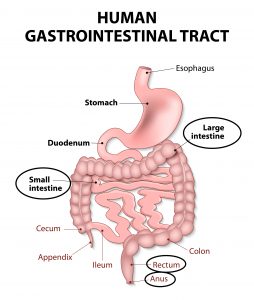What is bowel incontinence?
Bowel incontinence is the inability to control bowel movements and involves accidental loss of stool and/or gas. People who have this type of incontinence may not be able to make it to the bathroom in time to have a bowel movement. Many people who have bowel incontinence do not want to share their symptoms because they feel embarrassed or ashamed. Some people might believe that this is a problem only experienced by very young or very old people but it can be a problem for people of all ages.
Bowel incontinence can be an acute or chronic process. An acute process happens over a short period of time and then goes away. A chronic process is something that continues to happen over a long period of time.
What causes bowel incontinence?
Having a bowel movement is a complex process. It involves the following structures:
- intestines, where food is digested
- rectum, where stool is held
- anus, where stool leaves the body
These structures are made up of different types of tissue, muscle and nerves. Anything that affects these tissues, muscles and nerves can lead to bowel incontinence.
An important part of a normal bowel movement is the anal sphincter complex. This complex is made of muscles that help control when and if a bowel movement can occur. These are the muscles that you use to have a normal bowel movement.
Childbirth is a common cause of bowel incontinence. Stretching of the vagina with delivery of the baby can affect the anal sphincter complex. It can cause injury that results in difficulty controlling bowel movements. This can be experienced in the weeks and months after the child is born or even many years later.
There are many different causes of bowel incontinence in addition to childbirth. These causes include diseases and conditions that affect the structures mentioned above. For example, a stroke can affect the nerves involved in controlling a bowel movement. Surgery involving the intestines, rectum or anus can also lead to bowel incontinence. Some short-lived conditions, like diarrhea, can lead to bowel incontinence that improves once the diarrhea improves.
Who can I see about bowel incontinence?
You can start by talking to your primary care doctor. They may refer you to a specialist such as a gastroenterologist, urogynecologist or a colorectal surgeon.
 What happens if I go to my doctor with bowel incontinence?
What happens if I go to my doctor with bowel incontinence?
First, your doctor will ask you questions about your medical history and then do a physical exam. This will help them to figure out where there might be a problem.
The doctor may or may not suggest some additional testing. They might suggest a colonoscopy to look at the bowel, or an electromyography (EMG) which helps to test the nerves of the anus. Another test they might suggest is an ultrasound to look at the anal sphincter muscles. There are many other tests they may need to use to help figure out how best to treat the bowel incontinence.
How do you treat bowel incontinence?
Bowel incontinence can be treated in many different ways depending on the cause. Treatment might involve medications, exercises of the pelvic floor muscles, physical therapy, or surgery. The doctor will figure out the best treatment plan for you depending on what your goals are.
What is a rectovaginal fistula?
A fistula is an abnormal connection between two spaces. In the case of a rectovaginal fistula, a connection develops between the rectum, where stool travels through, and the vagina. People who have a rectovaginal fistula usually have symptoms of passing gas or stool through the vagina. They may also complain of having repeated vaginal or bladder infections.
What causes rectovaginal fistulas?
The most common cause is related to childbirth. During birth, there can be injury to the pelvic floor which can lead to tears in the vagina that need to be repaired. Even when these tears are correctly repaired, sometimes the healing process can be affected by infection or other issues that cause the repaired area to break down. This can lead to formation of a fistula.
Infection not related to childbirth can also lead to fistula formation. An abscess, which is an infectious collection, can lead to the formation of a fistula if it forms near the vagina and rectum.
Other causes of rectal fistulas include:
- Crohn’s disease
- prior surgery through the vagina such as a hysterectomy
- prior surgery to the rectum such as a hemorrhoid repair
- pelvic surgery, and chemotherapy or radiation therapy for cancer.
Who can I see about a rectovaginal fistula?
You can start by talking to your primary care doctor or ob/gyn. They may refer you to a specialist such as a urogynecologist or a colorectal surgeon.
What happens if I go to the doctor with a rectovaginal fistula?
First, your doctor will ask you questions about your medical history and then do a physical exam. This will help them to determine where there might be a problem. They will need to do a thorough examination of the vagina and rectum. They may need to use a speculum to look inside the vagina. They may also use a proctoscope, or small camera, to look inside the rectum. They may decide to do an in-office test for a fistula or they may suggest an imaging study including a CT scan, MRI or ultrasound. This is all to help determine if there is a fistula and where it is so that they can suggest the best way to fix it.
How do you treat a rectovaginal fistula?
Rectovaginal fistulas are usually treated with surgery. The type of surgery will be determined by the size, location, and original cause of the fistula. Sometimes fistulas will heal on their own, such as in the case of some small fistulas caused by childbirth. If there is an active infection involved, the doctor will likely recommend waiting for the infection to go away before surgery is attempted. This can take as long as 2-3 months. Depending on where the fistula is located, there are different surgical techniques to repair it.
Take Home Points
- Bowel incontinence is the inability to control bowel movements and involves accidental loss of stool and/or gas
- Childbirth is a common cause of bowel incontinence, but it can also be caused by surgery or by conditions such as stroke
- Treatment options for bowel incontinence include exercises of the pelvic floor, physical therapy, medicine or surgery
- A rectovaginal fistula is an abnormal connection between the rectum and the vagina, which causes a person to pass stool or gas through the vagina
- There are many causes of fistula, including childbirth, infection, surgery, and Crohn’s disease.
- Rectovaginal fistulas are usually treated with surgery
Author Information

Deepali Maheshwari, DO, MPH
Deepali is a fellow in Female Pelvic Medicine & Reconstructive Surgery at the University of Massachusetts Medical School. Her interests include surgical videos, technology in medicine, pelvic organ prolapse and minimally invasive surgical techniques. She has no conflicts of interest to report.

